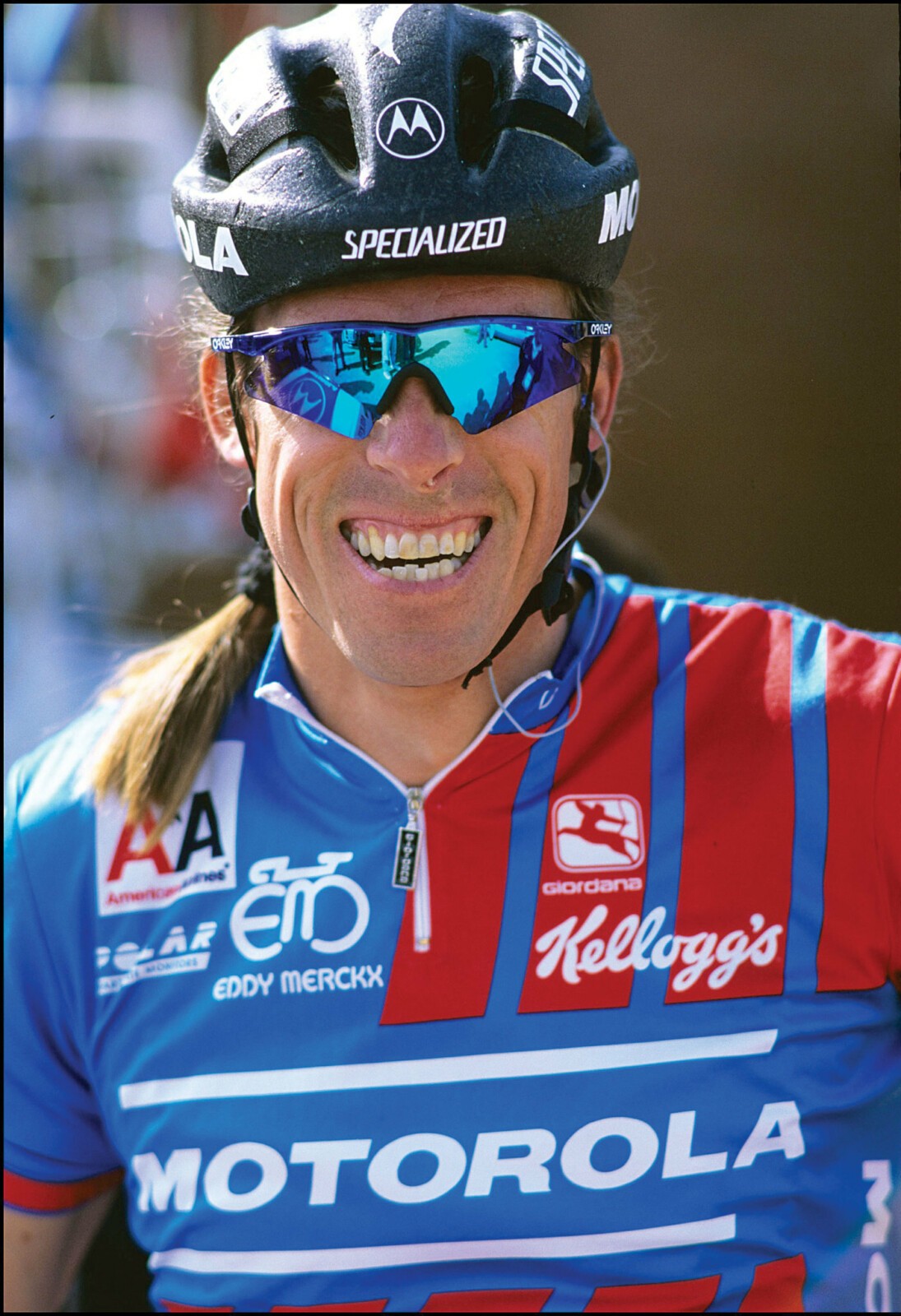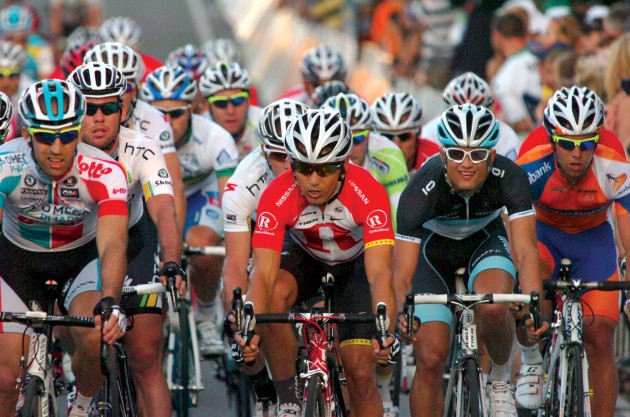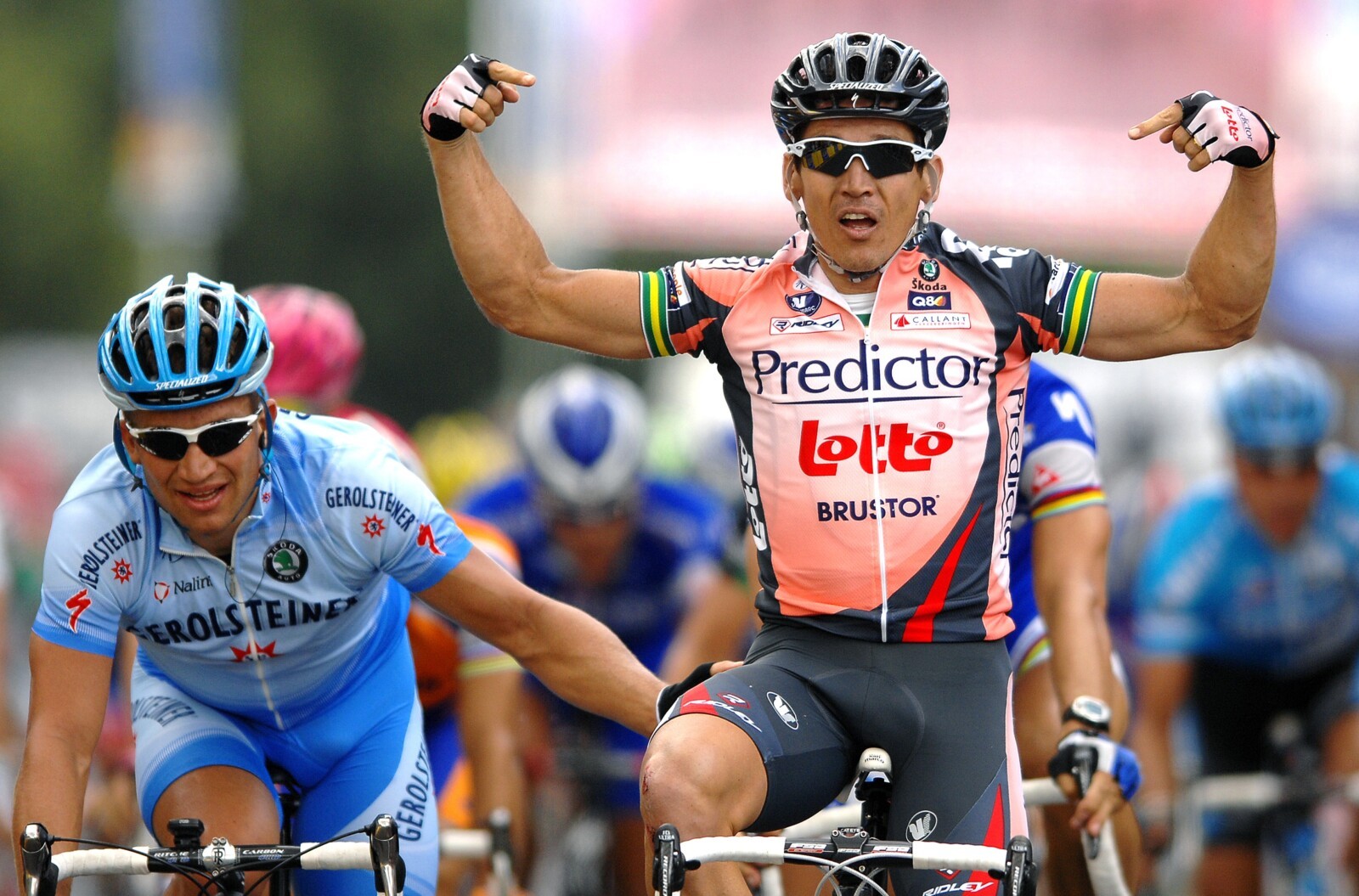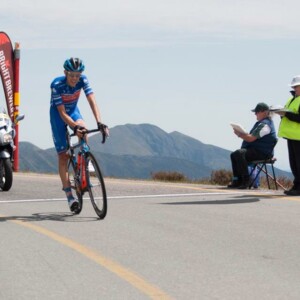I had this idea about retired cyclists. That they probably spend hours moping about the house, gazing forlornly at bulging trophy cabinets and photo albums, pining for glories and adulation long since past. Perhaps some are like that, particularly those who left the sport at the hands of others or a career-ending injury. But by the time the majority step off the bike it seems they’re more than happy to put racing – and, yes, the suffering that accompanies it – far behind them.
In the case of Jens Voigt, currently experiencing his first season as an ex-professional cyclist, it quickly becomes apparent that contrary to his outward persona in social media, the charismatic German couldn’t wait to put the life of a pro rider behind him fast enough. In fact, on a whistle-stop visit to Australia last December, Voigt left little doubt cycling is something he would gladly consign to the history books, at least for the time being. Less than three months since hanging up his Trek Madone, I asked if he still rode just for fun and fitness?

“Jesus f**k no, I don’t ride on my own!” exclaims the 43-year old with an endearing candour that masks the gravity of what he’s actually saying. “I only touch the bike when I’m forced to now. The other day I wondered ‘is my bike still in the garage?’ I wouldn’t know and I couldn’t care. I really need some time away from it.”
Far from the interview I was expecting, Voigt explains his current inner estrangement from the machine that carried him to fame over 18 professional seasons (and started, coincidentally, with the Giant-AIS team managed by Heiko Salzwedel in 1997) has been triggered largely by the way the early stages of his retirement have been handled.
“I agreed to a million things knowing 2014 would be my last season,” reflects Voigt, seemingly drowning in the sea of his own popularity. “I remember thinking ‘I’m going to be retired, I’ll have so much time.’ But the other day I was writing it all down and, f**k, every second day there’s something new. I’m in Australia now. Then I have to be in Spain for a training camp next week, then London for a meeting, then Hamburg for a TV show I agreed to three months ago, then I have a day at home, then it’s the Berlin Athlete of the Year awards, the next day I fly to Belgium for another gala dinner and get home on Friday night and, hopefully, spend the weekend with the kids. They’re already starting to complain!”
“You know, through my whole riding career I never had a manager,” Voigt continues. “But I’ve actually just signed with some people now to help me. One of the reasons I retired was because I want to have less stress. Right now I have much more!”
The other source of Voigt’s ambivalence towards riding right now is perhaps more to be expected. After nearly two decades he’s simply had enough.
“(In that last off-season) I really lost the motivation to go out training. ‘F**k, five hours of intervals or solo mountain biking in December?’ In my body I could go until I’m 45 or more. But my head was going ‘no, no.’ I also realised as I got older of course the chance to find a contract was getting smaller and smaller. The last thing I wanted after a good career was people saying ‘Jens we like you, but sorry.’ I wanted to be the master of my own destiny.”
It’s safe to say one thing Voigt’s destiny will never include is a comeback. “I’m no fan of comebacks,” he declares. “They normally end in some sort of disaster. I’ve squeezed everything out, mentally and physically, so hell no, I’m not having a comeback. F**k that. I don’t want to suffer anymore. I don’t even want to ride in the rain anymore!”
The man from Grevesmühlenn, north-east of Hamburg, who once won Eastern Europe’s most prestigious and politicised cycling event, the Peace Race (1994), didn’t always feel this way of course. “Every athlete, including myself, is good at pushing the thought of retirement far away when they’re young. Retirement is a little bit like you die; everything you live and work for is suddenly gone. But eventually you have to face it because one day it’s going to come.”
“When you first sign professionally you think if you have a little apartment you can retire happily. But when you get married and have a child you think ‘I’m going to need a bigger apartment now’. Or in my case you end up with six kids and need a huge house!”
Voigt may be laughing. But he’s not joking, confessing as his family and commitments grew over the seasons so did his anxiety levels.
“F**k yeah, it scared me,” he says. “I’m German. I’m conservative. To think the income you’ve had for the last 18 years will be gone. On one side, things might become better – you might earn more money for less hard suffering. But you’re going into the unknown and that’s frightening, most people don’t like surprises and I’m no different. It’s certainly not as if I can live off my (cycling) money for the next twenty years. I want a job, I need a job. You need a reason to get out of bed every morning.”
When he’s not traversing the globe, doing media interviews or attending to family duties – “my wife gave me a to-do list that will take five years to work down!” – Voigt enjoys more tranquil pastimes such as reading, movies and, wait for it, visiting zoos.
“Actually, I am off to the zoo after this interview,” he says with a smile. “I love zoos. I try to go to most zoos in the cities I visit. I’ve to been to Sydney, Melbourne and Perth zoos in Australia.”
Zoos or otherwise, you get the feeling time out of the saddle will eventually soften Voigt’s current, somewhat tortured, view of retirement; just as it has for hundreds of riders before him, including arguably the most influential figure in the history of Australian professional road cycling.
Phil Anderson
For the best part of two decades beginning in the mid-1970s, Phil Anderson blazed trails across Europe for generations of Australians to come. The Victorian won gold medals, Spring Classics and Grand Tour stages; and became the first non-European to wear the maillot jaune at the 1981 Tour de France, a feat he repeated in 1982. What is often overlooked, however, is Anderson also pioneered what it’s like to live as an ex-European pro cyclist in Australia.
“I was very much on my own throughout my career, and since,” reflects Anderson, 56, from his home in regional Victoria. “I never expected any assistance or handouts.”

“I always figured I’d come back to Australia once I’d finished racing,” he continues, revealing until his late teens his goals actually centred around a career in graphic design. “I regularly thought about life after cycling and while I kept getting good results I was able to negotiate better contracts and became one of the better paid riders of the time. I was reasonably careful with my spending and investments with a goal of retiring with enough to live on without the need to pursue a new career. I felt I was in a very fortunate position and never took that for granted.”
“For many of my colleagues there wasn’t too much future in the sport or otherwise after racing. The lucky ones would get a job on a team. Very few had tertiary qualifications and this remains the case (today). Despite the recent popularity of cycle-sport, unless you achieve the success of Cadel Evans – and even he could have challenges locally – I believe cyclists shouldn’t expect too much in Australia. The talk circuit and endorsement space is crowded and one’s currency is very short lived. Interestingly I suspect most riders deal reasonably well with this as, like racing, you’re only ever as good as your last win.”
In the same breath Anderson offers a cautionary observation. “There’s an increasing difficulty for young riders who are successful but not successful enough. They’ve been part of development squads and elite management programs from the junior ranks, protected and not able to make decisions for themselves. They have an expectation of success and can have real difficulty when they’re replaced by newer talent.”
Whilst many former Australian pros remain in Europe to capitalise on the greater opportunities available within the sport, Anderson believes it was the lack of opportunities back in Australia that allowed him to retire gracefully. “I really enjoyed that transition period,” he says looking back. “I still maintained a healthy exercise regime, taking up running pretty well straight away. The remainder of my time was occupied with creating what I had been dreaming about for years: I slowly built a country property in rural Victoria. I also wanted to work for myself and have been running my own business since retiring.”
“I never felt the need to try and replace the attributes of fame after retirement,” Anderson continues. “I think because I loved the sport more than my success as an athlete I found the changes easy. My life now is about sharing the passion for riding and racing. I get huge pleasure from delivering my guests to key aspects of tours and rides. I’m part of their personal journey and get to see their satisfaction when they ride to the top of mountains that most had never dreamt of reaching.”
“I still ride a couple of times a week, mostly with my partner down to the coffee shop. I do keep fit though, running with a couple of border collies and every now and then I’ll have a hard ride. Can’t have guests waiting for me!”
Robbie McEwen
Around the same time Anderson was stepping off his bike in the mid-1990s a talented former BMX champion from Brisbane was just getting started; and he’d also go on to wear the coveted maillot jaune. Having achieved virtually everything a sprinter can through the ensuing decade and half, Robbie McEwen retired after the 2012 Tour of California and couldn’t be much happier with the way things have unfolded since.
“I probably could have gone on for another couple of years,” a relaxed McEwen explains from his home at Nobby’s Beach on the Gold Coast. “But I was ready to start that next phase of my life. I was 40, and I had to be honest with myself. Once you get to 38 you’re not getting better or faster, you’re trying to slow the slide. I was also very fortunate; with Gerry Ryan and Shane Bannan I was able to map out how I’d go into retirement and also knew what I’d be doing immediately after, staying with Orica-GreenEDGE in different role.”
Also smoothing the transition for McEwen was knowing exactly where home would be once he finally stopped racing. “I always wanted to live near the beach; I worked that out when I was about 7 years old. I went from the south side of Brisbane to the Gold Coast, via Belgium!”

McEwen, a keen surfer, points out one advantage of retirement is he can now pursue any activities he chooses. “(In my career) one or two contracts specifically said I couldn’t take part in adventure sports, stuff that people bust themselves up doing. Surfing? I did get asked the question once. I just said ‘nah, if you fall off you just fall in the water’. Then they said, ‘well what about sharks?’”
Like many elite athletes, it was a serious injury that first brought life after cycling into sharp focus for McEwen. “I was confronted with possible immediate retirement in 2009 when I broke my leg at the Tour of Belgium. I’d had a pretty long career up to then so it wasn’t like I was going to be destitute. It was more about ‘I’m not ready to retire’. That made me realise the way you feel about retirement probably depends on the path you’ve taken to get there.”
“Towards the end of your career people are also constantly asking ‘when are you going to retire?’ Everyone wants to get the scoop. But really who is anyone to tell you when to stop? Take a guy like Chris Horner. Sure he’s 43, but if he’s still enjoying the riding and training and someone wants to have him on their team, why shouldn’t he keep going?”
Keeping going, right to the finish, is something McEwen did better – and faster – than virtually any other rider for 16 professional seasons. But the Queenslander is quick to point out even in the earlier stages of his career he was conscious of retirement. In fact as we talk it becomes clear he’s been as shrewd with his money as he ever was with his racing. “I spent my first contract on an apartment. Then I bought another property and another. With three-and-a-half years to go I also bought a café on the Gold Coast – my wife manages that today, she really enjoys it.”
Of course not every rider has the luxury of bowing out of the sport as a three-time green jersey winner. But McEwen suggests the majority of retiring pros, even those with more humble palmarès, do so in solid financial shape.
“Riders who go through their entire career as domestiqués still earn pretty good money so, really, they’re not going to have nothing to show for it,” he explains. “Those guys would have paid off their house well and truly – that’s the life of a professional athlete, you pack a lifetime of work into 10 or 12 years.”
“That said, I’m in a really fortunate position the way cycling has boomed in Australia. There’s quite a bit of corporate work for riders of my vintage. Going for a ride with a pro or an ex-pro has become the new pro-am golf day. I get to meet interesting people and go to interesting places. It’s a lot of fun.”
Since retiring McEwen has also continued to race. He won several high-profile domestic criteriums in 2012 and 2013, and still mixes it with the Gold Coast locals when he can.
“In the past six weeks I’ve actually done three club races,” he says. “My son likes to get out and race, so I’ll often take the bike too. It’s good to ride around with the guys. Sometimes it’s nice just to suffer a bit.”
These days McEwen averages a decidedly mortal 200km-250km a week. Yet while the training volume may be down he still brings pannier-loads of race smarts to the start line. “For a 45-minute race I can still give it some!” he laughs. “I also have about a million kilometres on the clock so there’s a fair bit of muscle memory there. I can still ride along with most people – until it goes uphill anyway!”
Club crits are one thing. But does he ever miss the WorldTour? “Look, nothing can replace the feeling of blasting out of the pack and winning a Tour stage,” McEwen admits, having done precisely that on twelve occasions, more than any other Australian. “But when you remember just how hard it is to do and what you had to sacrifice to achieve it, you tend to miss it a whole lot less. It’s like having eaten a beautiful gourmet seven-course meal. It was fantastic, but I’m not hungry any more.”
One thing the busy father of three is hungry for is more time with his growing family. “I love seeing my kids doing sport and really enjoying it,” he says, admitting he’s still away from home more than he’d like. “The look on my son’s face when he’s on the start line, that anxious anticipation, I remember that when I was a kid. Or I see my eldest daughter beating the boys in beach flags at nippers on a Sunday morning, that puts a big smile on my face.”
As for the future? “I’m exploring a bit of everything at the moment, including doing commentary [McEwen was widely applauded for his expert commentary at both the Santos Tour Down Under and Cadel Evans Great Ocean Road Race during the Australian summer]. I guess we’ll see after that. But I certainly want to stay involved in cycling. It gave me everything.”

